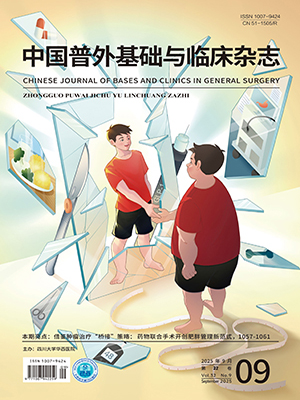| 1. |
鲍宁, 吕黄伟, 刘钢.二氧化碳气腹对妇科腹腔镜手术患者术后早期认知功能的影响.中国血液流变学杂志, 2010, 20(2):253-255.
|
| 2. |
龚旭华, 李鹏, 易斌, 等.妇科腹腔镜与开腹手术对老年患者术后认知功能的影响.重庆医学, 2010, 39(17):2290-2291.
|
| 3. |
吴丹.七氟醚和异丙酚全身麻醉对老年患者麻醉后苏醒时间及术后认知功能的影响对比.中国药业, 2013, 22(5):95-96.
|
| 4. |
李宝永, 蒲国华, 刘铁军.右美托咪定与亚麻醉剂量氯胺酮对老年患者腹腔镜胆囊术后认知功能的影响.中国医刊, 2015, 4(4):86-88.
|
| 5. |
孙振涛, 孙雪青, 韩雪萍, 等.不同呼吸参数对妇科腹腔镜手术后早期认知功能的影响.临床麻醉学杂志, 2014, 30(7):686-688.
|
| 6. |
Park EY, Koo BN, Min KT, et al. The effect of pneumoperitoneum in the steep Trendelenburg position on cerebral oxygenation. Acta Anaesthesiol Scand, 2009, 53(7):895-899.
|
| 7. |
中华医学会神经病学分会痴呆与认知障碍学组写作组, 中国阿尔茨海默病协会(ADC).中国痴呆与认知障碍诊治指南:轻度认知障碍的诊断和治疗.中华医学杂志, 2010, 90(41):2887-2893.
|
| 8. |
Lee CN, Ko D, Suh YW, et al. Cognitive functions and stereopsis in patients with Parkinson, s disease and Alzheimer's disease using 3-dimensional television:a case controlled trial. PLoS One, 2015, 10(3):e0123229.
|
| 9. |
杨纯勇, 易斌, 郭巧, 等.术后认知功能障碍的临床评估工具进展.重庆医学, 2010, 39(17):2319-2320.
|
| 10. |
American Diabetes Association. Standards of medical care in diabetes-2014. Diabetes Care, 2014, 37(Suppl 1):S14-S80.
|
| 11. |
中华医学会神经病学分会脑血管病学组急性缺血性脑卒中诊治指南撰写组.中国急性缺血性脑卒中诊治指南(2010年版).中华神经科杂志, 2010, 43(2):146-153.
|
| 12. |
中国高血压防治指南修订委员会.中国高血压防治指南2010.中华心血管病杂志, 2011, 39(7):579-616.
|
| 13. |
中国成人血脂异常防治指南制订联合委员会.中国成人血脂异常防治指南.中华心血管病杂志, 2007, 35(5):390-419.
|
| 14. |
庄心良, 曾因明, 陈伯銮, 等.现代麻醉学.北京:人民卫生出版社, 2003:598-600.
|
| 15. |
Rohan D, Buggy DJ, Crowley S, et al. Increased incidence of postoperative cognitive dysfunction 24 hour after minor surgery in the elderly. Can J Anaesth, 2005, 52(2):137-142.
|
| 16. |
姚立农, 张宏.老年人术后认知功能障碍的研究现状.国外医学:麻醉学与复苏分册, 2001, 22(4):217-220.
|
| 17. |
饶佳华, 姜虹.老年人术后认知功能障碍研究进展.医学综述, 2008, 14(16):2473-2475.
|
| 18. |
岳英, 张建光, 王伟, 等. 632名术后抑郁症发病率及其认知功能障碍分析.河北北方学院学报, 2006, 23(2):58-59.
|
| 19. |
Monk TG, Weidon BC, Garvan CW, et al. Predictors of cognitive dysfunction after major no cardiac surgery. Anesthesiology, 2008, 108(1):18-30.
|
| 20. |
方梅, 董志红, 张冰.右美托咪啶对老年患者腹腔镜下宫颈癌根治术后早期认知功能的影响.中华麻醉学杂志, 2012, 32(6):699-701.
|
| 21. |
薛金配, 王军, 宗川曰, 等.右美托咪定预防胃癌根治术患者全麻苏醒期躁动45例观察.陕西医学杂志, 2014, 43(1):96-97.
|
| 22. |
Lasarzik I, Noppens RR, Wolf T, et al. Dose-dependent influence of sevoflurane anesthesia on neuronal survival and cognitive outcome after transient forebrain ischemia in Sprague-Dawley rats. Neurocrit Care, 2011, 15(3):577-584.
|
| 23. |
王云川, 陈有英, 王军, 等.硬膜外阻滞对老年全身麻醉下腹腔镜结肠癌根治术后认知功能的影响.重庆医学, 2015, 40(18):2499-2503.
|
| 24. |
龚涛武, 朱昭琼, 郑雪, 等.不同全身麻醉方法对腹腔镜胆囊切除术后早期认知功能的影响.第三军医大学学报, 2013, 35(1):50-53.
|
| 25. |
Deiner S, Silverstein JH. Postoperative delirium and cognitive dysfunction. Br J Anaesth, 2009, 103 Suppl 1:i41-i46.
|
| 26. |
Maldonado JR, Wysong A, van der Starre PJ, et al. Dexmedetomidine and the reduction of postoperative delirium after cardiac surgery. Psychosomatics, 2009, 50(3):206-117.
|
| 27. |
鲍宁, 吕黄伟.二氧化碳气腹对妇科腹腔镜手术患者术后早期认知功能S-100β和NSE的影响.中国医师杂志, 2010, 12(8):1033-1036.
|




